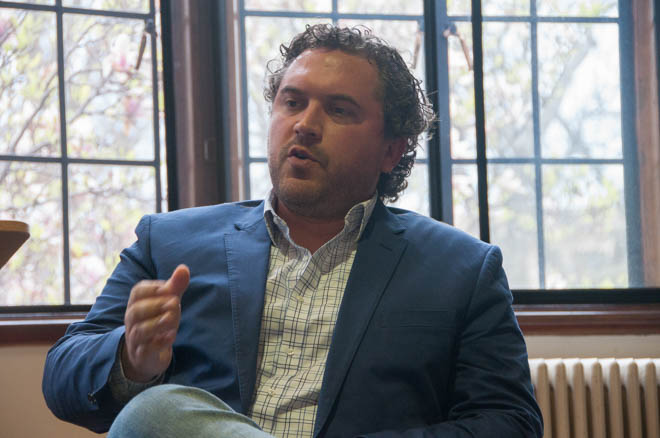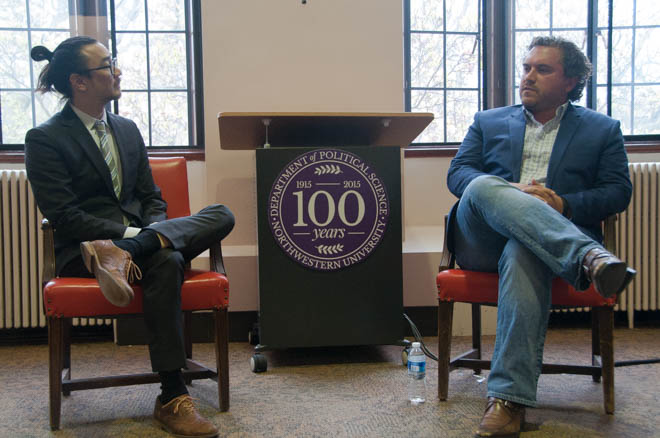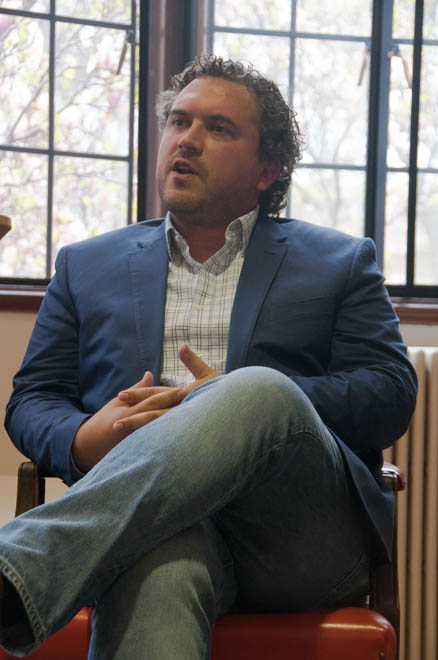While Northwestern alum Stephen Colbert is known for satirizing American politics, on Wednesday night, students and faculty had the chance to talk with a former Wildcat who actually works in the West Wing: White House Director of Speechwriting Cody Keenan, who graduated from Weinberg in 2002.
Invited by the Department of Political Science, Keenan spoke at the 2016 Admiral Weber Lecture, an annual event which honors the late faculty member Alban "Stormy" Weber.
In a discussion moderated by political science and sociology professor Anthony Chen, Keenan touched on a variety of topics ranging from his time working for President Obama to advice for NU students.
Road to the White House
Although he's now at the top of his field, Keenan said his career path wasn’t always so clear.
“If someone had come up to me my freshman year in 1998 and said, ‘10 years from right now, you’ll be writing speeches for the first Black president who saved the global economy, rescued the auto industry, smoked Bin Laden, passed universal health care, opened up Iran … [and] opened up Cuba’, I would have said, ’Here’s a dollar. Leave me alone,” Keenan said.
In fact, after graduating from Northwestern in 2002, Keenan found himself jobless for 11 months. It wasn’t until he returned for his first homecoming after graduation and was urged by two of his fraternity brothers to move to Washington, D.C., that he finally started to find his footing, landing an internship in former Sen. Ted Kennedy’s office.
One of 50 interns at the time, Keenan said he learned that working in politics was “nothing like The West Wing," but that through his work in the mailroom opening letters from real people, he began to see how rewarding a career in government could be. Leaving his post to pursue an advanced degree, Keenan said he fully intended to go back to Kennedy’s office, but his journey ended up taking a vastly different direction.
“Lightning struck and a woman named Stephanie Cutter ... introduced me to a guy named Jon Favreau, who was the president’s first chief speechwriter,” Keenan said. “He was alone on the campaign and they were about four months into it and he said ‘Can you write?’ and I said ‘Yes’ and he hired me over the phone as his intern.”
Since then, Keenan’s been “along for the ride,” working with President Barack Obama on both campaigns, as well as through his time in the White House.
The speechwriting process
Taking over as Director of Speechwriting in 2013, Keenan has been there through it all. With the president’s busy calendar, he said he has written a wide variety of speeches, but that they typically fall into one of four categories: daily message events, stump speeches, ceremonial speeches and large speeches like the State of the Union, which Keenan calls “policy monsters.”
“It’s like driving a car with no doors 200 miles an hour just trying to get that over the finish line,” he said of those massive projects.
Luckily for him, Keenan is not alone. Keenan said that speechwriters, who work in a team of eight, rely heavily on policy experts to make sure that they are representing an issue or a particular piece of legislation correctly. After the writer is finished, he said, speeches are vetted by about 70 people and the president makes final edits.
Although there are many aspects of a good speech, Keenan said one of the most important is finding a human connection.
“Part of speechwriting is empathy,” Keenan said, explaining that some of which comes by reading personal letters sent over by the Office of Presidential Correspondence. According to Keenan, President Obama requests 10 letters each day and the stories told by ordinary Americans are often the most powerful. However, empathy can make it difficult to write about tragedies.
“Newtown is the worst thing I’ve ever had to write,” Keenan said. “I found myself crying all night long because how do you write about 20 dead six-year-olds?”
But the job is not always so serious, Keenan said, especially when it comes to events like the White House Correspondents Dinner. Although humor can be difficult, the president’s set is always a team effort and ends up being pretty memorable. Keenan’s favorite? The 2011 dinner, where Obama confronted Donald Trump by presenting his authentic United States birth certificate.
“We could work here for 25 more years and not do one as good as 2011,” Keenan said with a laugh.
Relationship with President Obama
When conversation turned to his boss, Keenan spoke highly of the President. Still scandal free eight years in, Obama’s favorability ratings are the best they’ve been since 2009.
“We were joking a couple months ago that the only way we’d ever get to 55 [percent] again is if we dug up Bin Laden and killed him again,” Keenan said.
Much to the delight of the crowd, he also shared a little about what President Obama is like behind the scenes. When discussing one his favorite speeches, which Obama gave upon receiving the Nobel Peace Prize, Keenan said that the president actually felt undeserving of the award.
“For the lack of a better word, he was embarrassed to get the Nobel Prize ... he said, ‘let’s give a speech about why I haven’t earned this yet’.”
According to Keenan, aside from modesty, Obama also has a great sense of humor. When working on a social media blast for the final State of the Union address, Keenan said he suggested using the Jay-Z lyrics “treat my last like my first” to connect to millennials on Twitter. While the President was initially hesitant, he soon came around to the idea.
“He just started playing that song on his iPad ... and he’s like ‘yeah, let’s do it,’” Keenan said.
With Obama reaching the end of his last term, Keenan said if he could give the president some advice, he would have made a particular request:
“I would have told him to put his library at Northwestern,” Keenan said.
Advice for students
As a former Wildcat, Keenan had some advice for current Northwestern students who may be inspired by his success. First off, he said education is pretty valuable, but concepts are not always absolute.
“The things you learn here [at Northwestern] are by and large true,” Keenan said. “But when you get to Washington ... reality is often nothing like theory.”
While a good GPA is certainly important, he said, when hiring interns, he looks more for diverse life experiences than a perfect transcript. Overall, Keenan said finding your passion and pursuing it is the best way to be successful.
“Figure out what you actually like doing,” Keenan said. “The answer to that question shouldn’t be, ‘I want to work in the White House,’ it should be ‘I care about education policy’ or something like that.”
Once you find your area of interest, “hit the ground running,” Keenan said. While it may seem like the perfect job just comes out of thin air, through hard work and dedication, Keenan said “you actually make your own lucky breaks.”
After the event, Weinberg sophomore Olyvia Chinchilla said Keenan gave great insight into the political process and his Northwestern background only made it better.
“I thought it was really neat to see someone who was walking in our shoes not too long ago serving in a pivotal role in government,” she said.


